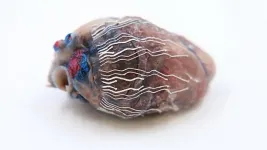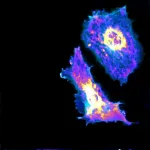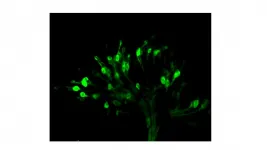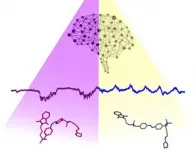FDA advisory panelist outlines issues with aducanumab's approval for Alzheimer's disease
2021-06-18
(Press-News.org) Below please find a summary for a new article that will be published today in Annals of Internal Medicine. The summary is not intended to substitute for the full article as a source of information. This information is under strict embargo and by taking it into possession, media representatives are committing to the terms of the embargo not only on their own behalf, but also on behalf of the organization they represent.
FDA advisory panelist outlines numerous issues with aducanumab's accelerated approval for Alzheimer's disease
Abstract: https://www.acpjournals.org/doi/10.7326/M21-2603
URL goes live when the embargo lifts
Despite near unanimous objection from its advisory panel, the U.S. Food and Drug Administration (FDA) granted aducanumab approval to treat Alzheimer's disease on June 7, 2021. In a commentary published in Annals of Internal Medicine, a member and former Chair of the advisory panel and an aducanumab site investigator explain why this unprecedented "accelerated approval" is problematic for clinical research and patient care.
Under accelerated approval, a drug is approved based on its effect on a surrogate marker of a disease rather than clinical outcomes. The product is expected to provide a meaningful advantage over other available therapies for a serious disease. Aducanumab's phase 1 study indicates the drug reduces beta-amyloid (the surrogate marker of disease), but whether beta-amyloid alone is a valid surrogate for the treatment of Alzheimer's is notably unclear and still a topic of ongoing important study. With the surprising approval, treating an amyloid level becomes clinical practice.
The authors express grave concern that aducanumab's approval will have important consequences for drug development, regulation, and patient care. While the world waits for the results of randomized and controlled clinical trials required to confirm aducanumab's clinical benefits (or not), insurers and payers will have to use the scant information available to determine which patients should take it and how to cover it. The copays for aducanumab, which may be as much as 20% of the total cost, will be added to the already substantial financial burden many American families face due to Alzheimer's disease. Also, clinicians will have to address with patients, uncertainty regarding whether the drug is even beneficial or safe.
According to the authors, the effect of aducanumab's approval will reverberate for years. Patients, caregivers, providers, and scientists must navigate treatment of Alzheimer's disease with an uncertain treatment. Time will tell whether or not it is safe and effective.
INFORMATION:
Media contacts: For an embargoed PDF or to interview the corresponding author, G. Caleb Alexander, MD, MS, please contact Angela Collom at acollom@acponline.org or 609-367-4225.
ELSE PRESS RELEASES FROM THIS DATE:
2021-06-18
WEST LAFAYETTE, Ind. – Surgeons may soon be able to localize critical regions in tissues and organs during a surgical operation thanks to a new, patent-pending Purdue University biosensor that can be printed in 3D using an automated printing system.
Chi Hwan Lee created the biosensor, which allows for simultaneous recording and imaging of tissues and organs during a surgical operation. Lee is the Leslie A. Geddes Assistant Professor of Biomedical Engineering in the Weldon School of Biomedical Engineering and assistant professor of mechanical engineering. Lee also has a courtesy appointment in materials engineering.
"Simultaneous recording and imaging could be useful during heart surgery in localizing critical regions and guiding ...
2021-06-18
In the realm of social media, anti-science views about COVID-19 align so closely with political ideology -- especially among conservatives -- that its predictability offers a strategy to help protect public health, a new USC study shows.
Resistance to science, including the efficacy of masks and vaccines, poses a challenge to conquering the coronavirus crisis. The goal of achieving herd immunity won't happen until society achieves consensus about science-based solutions.
The USC study's machine-learning assisted analysis of social media communications offers policymakers and public health officials new tools to anticipate shifts in attitudes ...
2021-06-18
A rare parasitic infection imported from Europe continues to take root in Alberta, Canada. The province is now the North American hotspot for human alveolar echinococcosis (AE), which takes the form of a growth in the liver, causing serious and potentially deadly health complications.
A END ...
2021-06-18
Only 2% of vehicles are electrified to date, but that is projected to reach 30% in 2030. A key toward improving the commercialization of electric vehicles (EVs) is to heighten their gravimetric energy density - measured in watt hours per kilogram - using safer, easily recyclable materials that are abundant. Lithium-metal in anodes are considered the "holy grail" for improving energy density in EV batteries compared to incumbent options like graphite at 240 Wh/kg in the race to reach more competitive energy density at 500 Wh/kg.
Yan Yao, Cullen Professor of electrical ...
2021-06-18
MIAMI--In a new analysis on managed retreat--the climate adaptation response of moving people and property out of harm's way--researchers explore what it would take for managed retreat to be supportive of people and their priorities. A key starting point is considering retreat alongside other responses like coastal armoring and not just as an option of last resort.
In a new paper in the journal Science, University of Miami (UM) Rosenstiel School of Marine and Atmospheric Science researcher Katharine Mach argues that managed retreat should be viewed as a proactive option that can support communities and livelihoods in the face of climate change.
"Managed retreat ...
2021-06-18
The surface of a material often has properties that are very different from the properties within the material. For example, a non-conducting crystal, which actually exhibits no magnetism, can show magnetisation restricted to its surface because of the way the atoms are arranged there. These distinct properties at interfaces and surfaces of materials often play a key role in the development of new functional components such as optoelectronic chips or sensors and are therefore subject to extensive research. An international research team from the University of Göttingen, the Max Planck Institute for Biophysical Chemistry Göttingen and the National Research Council Canada has now succeeded in investigating the surfaces of transparent crystals using ...
2021-06-18
Understanding cellular metabolism - how a cell uses energy- could be key to treating a wide array of diseases, including vascular diseases and cancer.
While many techniques can measure these processes among tens of thousands of cells, researchers have been unable to measure them at the single-cell level.
Researchers at the University of Chicago's Pritzker School of Molecular Engineering and Biological Sciences Division have developed a combined imaging and machine learning technique that can, for the first time, measure a metabolic process at both the cellular and sub-cellular levels.
Using a genetically encoded biosensor paired with artificial intelligence, ...
2021-06-18
PHILADELPHIA - Sour taste does not have the nearly universal appeal that sweet taste does. Slightly sour foods or drinks such as yogurt and lemon juice are yummy to many, but such highly sour foods as spoiled milk are yucky, even dangerous. Like humans, many other animals, including insects, prefer slightly acidic over very acidic foods.
Evolutionary biologists surmise that the need for sour detection to be finely tuned is a two-sided coin: slightly acidic foods can enhance digestion and stimulate saliva production; relative sour-to-sweet taste can signal optimal ripeness of fruit; and extremely sour food, as with bitter taste, is a warning to what not to ingest. However, despite this usefulness, how do animals discern different concentrations ...
2021-06-18
The brain presents different states depending on the communication between billions of neurons, and this network is the basis of all our perceptions, memories, and behaviours. It is often considered a "black box", with difficult access for clinicians and researchers, as few limited tools are available to perform accurate and spaciotemporal studies on brain neuronal behaviour. Now, researchers from the Institute for Bioengineering of Catalonia (IBEC) in collaboration with August Pi i Sunyer Biomedical Research Institute (IDIBAPS) and have added some light to the subject: they succeeded for the first time in controlling neuronal activity in the brain using a molecule responsive to light.
The study included participants ...
2021-06-18
MADISON - In early January 2021, travelers returning to Tokyo, Japan, from Amazonas, Brazil, were screened for COVID-19 at the airport. A few days later, the National Institute of Infectious Disease of Japan announced that the travelers had returned with a new variant of the SARS-CoV-2 virus.
That variant, known as gamma, or P.1, led to a deadly surge in COVID-19 cases in Brazil this spring, and has now spread across the world. More than 200 cases have been detected in Wisconsin. Whether current vaccines are as effective against the gamma variant remains unknown.
In a new study using variant virus recovered from one of the original travelers, ...
LAST 30 PRESS RELEASES:
[Press-News.org] FDA advisory panelist outlines issues with aducanumab's approval for Alzheimer's disease






